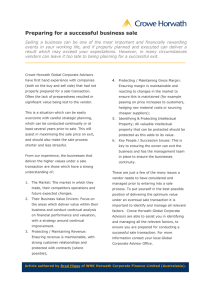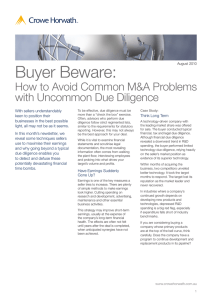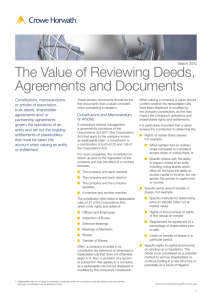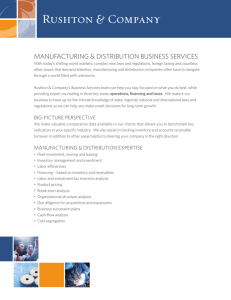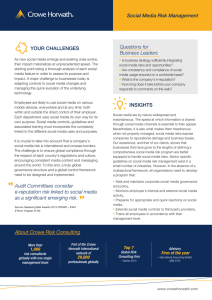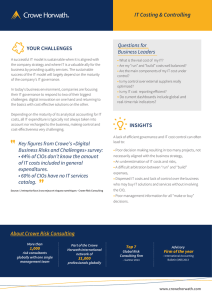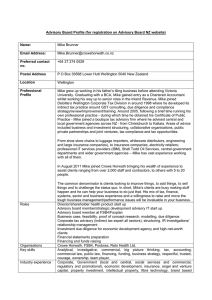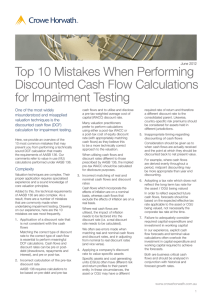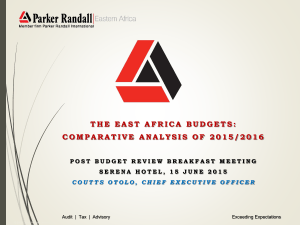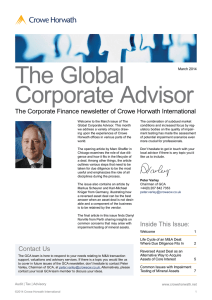Due Diligence Planning: More Important than Ever Effective Due Diligence
advertisement
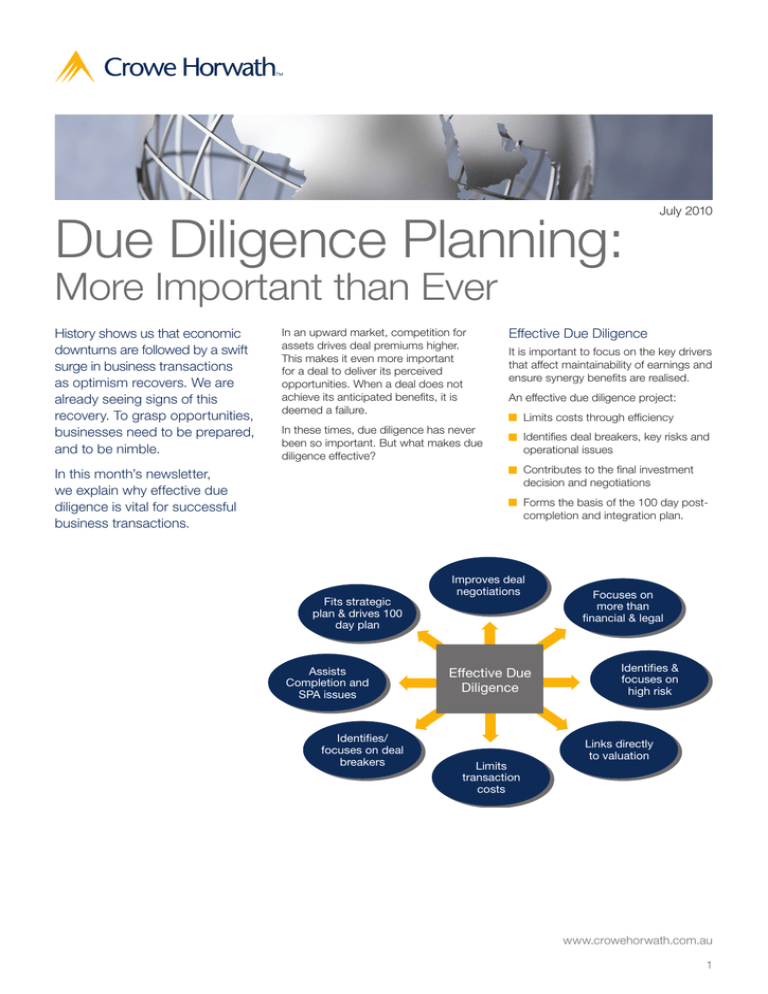
Due Diligence Planning: July 2010 More Important than Ever History shows us that economic downturns are followed by a swift surge in business transactions as optimism recovers. We are already seeing signs of this recovery. To grasp opportunities, businesses need to be prepared, and to be nimble. In an upward market, competition for assets drives deal premiums higher. This makes it even more important for a deal to deliver its perceived opportunities. When a deal does not achieve its anticipated benefits, it is deemed a failure. In these times, due diligence has never been so important. But what makes due diligence effective? In this month’s newsletter, we explain why effective due diligence is vital for successful business transactions. Fits strategic plan & drives 100 day plan Assists Completion and SPA issues Identifies/ focuses on deal breakers Effective Due Diligence It is important to focus on the key drivers that affect maintainability of earnings and ensure synergy benefits are realised. An effective due diligence project: Limits costs through efficiency Identifies deal breakers, key risks and operational issues Contributes to the final investment decision and negotiations Forms the basis of the 100 day postcompletion and integration plan. Improves deal negotiations Effective Due Diligence Limits transaction costs Focuses on more than financial & legal Identifies & focuses on high risk Links directly to valuation www.crowehorwath.com.au 1 Due Diligence Planning: More Important than Ever Case Study: The Effective Team Effective Due Diligence Helps Formulate your Integration Plan Putting together a due diligence team means finding people with the right skills and experience to cover your key risks. Consider each deal on a “caseby-case” basis to identify the specialists relevant to your deal. When you bring in specialists early, you can identify risk areas and value drivers upfront, before fieldwork begins. Effective Due Diligence Reduces Investment Costs Equipment was aged and would require replacement When acting for the prospective purchaser of a specialised railway component manufacturer, we were asked to comment on the forecasts provided by the vendors and any ongoing investment requirement. The forecasts were aggressive and the purchaser had some concerns. Running the equipment at full capacity would bring the replacement requirements forward Appoint a team with experience and expertise to cover all aspects of effective due diligence R Cost synergies Ensure that the parties understand the strategic context before the due diligence commences. Input costs VALUE Distribution agreements Input prices Deal structure Working capital cycle TI A S Product maturity Stock valuation X TA Set and monitor a time line and reporting process Competition Product liability Understand the value drivers of the transaction and ensure the scope of the due diligence aligns LE Customer contract terms Separation issues HE Establish the framework and parameters for the due diligence team to work within SA Foreign exchange movements OT Our client used our analysis and the Manufacturing Manager’s observations to negotiate a reduction in the purchase price equal to the investment required to upgrade the facility. Our analysis identified that a large percentage of the revenues were contracted. Even though the revenues The Effective Plan When designing a due diligence plan, it is essential to: There were a number of Occupational Health and Safety issues. ON MARGIN Following our due diligence, the supplier formulated a 100 day post-completion and integration plan that incorporated strategies to overcome the inefficiencies in the business. Case Study: Total manufacturing capacity was well below the required levels implied in the forecast OSS While the supplier understood the nature of Mr Simpson’s business and how it was run, the supplier was concerned about aspects of the business’ internal administration. To understand the potential risks, the supplier engaged Crowe Horwath Corporate Finance to conduct financial due diligence and to perform time studies around the internal administration function. GR Business growth brought the need for further capital. Mr Simpson found a local supplier who was interested in injecting equity into his business. For plant capacity and utilisation, we worked with the purchaser’s Manufacturing Manager. We identified that: Capex requirements CASH F LO W E ASS ES Mr Simpson’s business, selling patented construction machines, grew so rapidly in the early years that he was able to offer employment to people in his regional town, an area where jobs were badly needed. for the forecast were significantly more than historically achieved, the revenues reflected contracted production for a number of years. U AL V T Key: Valuation impact: High Medium Low www.crowehorwath.com.au 2 Due Diligence Planning: More Important than Ever For Further Information The Effective Focus For further information, please contact your local Transaction Services Team. Initially, focus is on high risk and high impact areas. These have the potential to break the deal. A due diligence team that links its findings to the context in which value of the transaction has been determined is one that delivers maximum value. Andrew Fressl Principal Tel +61 2 9619 1669 Mobile 0416 212 093 andrew.fressl@crowehorwath.com.au Karth Sreeskantapathy Associate Principal Tel +61 2 9619 1844 Mobile 0400 487 211 karth.sree@crowehorwath.com.au Some of the key drivers we look at to evaluate a business include: Case Study: Effective Due Diligence Means Understanding the Key Transaction Drivers When a leading entertainment distribution business sought to acquire the distribution business from another international entertainment business, a significant element of the deal was that the vendor would continue to distribute its products through its divested distribution business. This required the valuation of the unit cost of distribution for the three years following the deal. Despite the purchaser’s appointment of a due diligence expert to perform relevant financial analysis. The expert’s report covered historical financial analysis but did not address the key commercial issue: a per unit cost of distribution. The purchaser engaged Crowe Horwath Corporate Finance to re-examine the due diligence, particularly on the current and achievable unit costing. We focused on utilisation of plant being acquired, staffing levels and the overall cost structure of the distribution function. As this was not a traditional business or share sale, it was important that our due diligence team understood and stayed focused on the key transaction drivers. Crowe Horwath Corporate Finance With Crowe Horwath’s expert Corporate Finance team, your business transactions will be appropriately assessed, run smoothly and efficiently, and you will receive relevant advice you can actually use. Crowe Horwath in Australia Crowe Horwath works with companies and individuals to maximise their growth potential and achieve financial goals. The firm’s team of more than 800 principals and professionals delivers a full range of accounting including, audit and taxation, business advisory, corporate finance and wealth management services nationally from offices in Brisbane, Melbourne, Perth and Sydney. Crowe Horwath is an integral part of the ASX-listed WHK Group – Australia’s fifth largest accounting services group – and a member of the global Crowe Horwath International network. Crowe Horwath International is ranked among the world’s top-ten accounting networks and comprises more than 140 independent accounting and advisory services firms in more than 100 countries. See www.crowehorwath.com.au. The relationship you can count on Crowe Horwath Corporate Finance Ltd is a member of Crowe Horwath International, a Swiss verein. Each member firm of Crowe Horwath is a separate and independent legal entity. Crowe Horwath Corporate Finance Ltd and its affiliates are not responsible or liable for any acts or omissions of Crowe Horwath or any other member of Crowe Horwath and specifically disclaim any and all responsibility or liability for acts or omissions of Crowe Horwath or any other Crowe Horwath member. The information contained within this document was compiled by Crowe Horwath Corporate Finance Ltd (CHCF) based on materials from other sources and no warranty regarding the accuracy or completeness of the information is provided. All opinions, conclusions, forecasts or recommendations are reasonably held at the time of compilation but are subject to change without notice by CHCF. CHCF assume no obligation to update this document after it has been issued. Except for any liability which by law cannot be excluded, CHCF/WHK Group Limited, its Directors, employees and agents disclaim all liability (whether in negligence or otherwise) for any error, inaccuracy in, or omission from the information contained in this document or any loss or damage suffered by the recipient or any other person directly or indirectly through relying upon the information. This publication is intended to provide background information only and does not purport to make any recommendation upon which you may reasonably rely without taking further advice. This publication does not take into account any person’s investment objectives, financial situation and particular needs. Should you consider the acquisition of a particular financial product as a result of the material contained, you should obtain a copy of and consider the Product Disclosure Statement (where applicable) for that product before making any decision. CHCF may receive a fee for advice and/or the implementation of an investment decision. CHCF and their representatives may have financial interests in some/any of the product(s) included within this report. Crowe Horwath Corporate Finance Ltd is the holder of an Australian Financial Services Licence – No: 239170, ABN 95 001 508 363 – a WHK Group firm. www.crowehorwath.com.au 3
